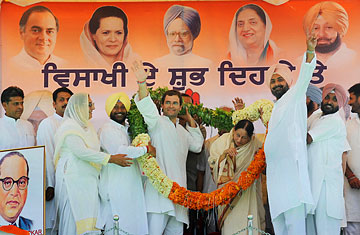
Rahul Gandhi, center, at an election campaign rally at the village Talwandi Sabo on April 14
Rahul Gandhi, heir to modern India's most storied family, touched down by helicopter and spoke for only seven minutes, but in that short stump speech to a friendly crowd in northern India's farm belt, he set out what he hopes will be a road map for a Congress Party victory in the general election that begins on April 16.
First: turn inexperience into an advantage. Gandhi, 38, is at least a generation younger than most of the other leaders of his party (let alone the opposition), and he has had little more than his pedigree and a few years as a consultant to back his entry into politics. He was an energetic campaigner in 2004, but those elections really belonged to his mother, Sonia Gandhi, who asserted her canny leadership of the party in putting together a winning coalition. This year, Rahul Gandhi is trying to make his mark, with a pledge to democratize the institutions of his party. He has promised that within two years, the youth wing of the Congress Party will choose its leadership by vote rather than by appointment, and he has pledged to increase the number of people under 35 who run for office on Congress tickets. Opening up the Congress Party, he says, will help energize the country and create a more engaged electorate, who will hold their elected officials accountable. "It's an attitude, it's an idea," he said in an interview after the rally. "It's not simply about winning an election." (See pictures of the tempestuous Nehru-Gandhi dynasty of India.)
Second: fight back on terrorism. The Hindu nationalist Bharatiya Janata Party (BJP), the biggest opposition party, has been relentlessly criticizing the Congress Party for being "soft on terror" — India has suffered through a dozen serial blasts over the past two years. The BJP stepped up its rhetoric after the three-day terrorism attacks in Mumbai, but in this speech Gandhi struck back sharply. He reminded the crowd that it was a BJP government that negotiated the handover of three Muslim extremists to end the 1999 hijacking of an Indian Airlines plane in Kandahar, Afghanistan, a decision that proved disastrous — one of the jihadis who was released was later sentenced to death in Pakistan for the murder of journalist Daniel Pearl. L.K. Advani, the BJP's prime-ministerial candidate, was India's Home Minister at the time but recently said he was unaware of the planned exchange. "There are only two possibilities," Gandhi said. "Either Vajpayee [who was Prime Minister] didn't trust him, or Advani is not telling the truth."
Third: remember your base — a big reason for Gandhi's appearance at the farm-belt rally. The rural poor still make up the vast majority of voters, and no party can win a general election without their support. Gandhi spoke to several thousand Congress supporters in Bhatinda, a small town dominated by mango, kinnow and guava orchards in the heart of rural Punjab. He trumpeted the National Rural Employment Guarantee Act, a welfare scheme for the poor that offers a minimum of 100 days of paid work to one person per family per year, and boasted about the Congress Party's $14 billion loan-waiver program for farmers, the largest ever in India. There have been widespread reports of money being siphoned off from these programs, but Gandhi deflected those criticisms, instead blaming corruption and inefficiency on the Punjab state government, which is controlled by a regional rival of the Congress Party. "The money disappears in the middle," he said.
Of course, winning an election is the main reason that Gandhi has come to Bhatinda. He has lent his star power to five young, handsome Congress candidates who are running for parliament from Punjab. All of them also come from politically well-connected families, though none with the name recognition of the Gandhis. The crowd waited under massive white awnings during the scorching midday heat to hear Gandhi at the rally, which was held during the April 14 Baisakh festival celebrating the spring harvest. He introduced each one of the candidates in turn, hailing them in his textbook Hindi as naujawan — the new young men who represent the future of the party. If they do well in this year's elections, Gandhi's effort to redefine the Congress Party will be vindicated. "It's a way of legitimizing his presence and his stature within the party," says Sandeep Shastri, the national convenor of Lokniti, a national network of academics who study Indian elections. Gandhi is planting the seeds in Punjab for a harvest that may be many years away.
